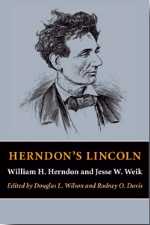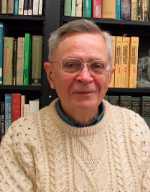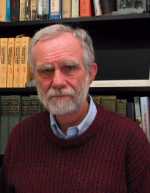Home | News | Books | Speeches | Places | Resources | Education | Timelines | Index | Search
Editor Interview
William H. Herndon and Jesse W. Weik, authors
Herndon's Lincoln
Douglas L. Wilson and Rodney O. Davis, editorsHerndon's Lincoln
University of Illinois Press, October 2006
464 pages, hardcover
Rodney Davis
Douglas WilsonDouglas L. Wilson and Rodney O. Davis completed an edition of Herndon's Lincoln, acclaimed by many authorities as the most influential Lincoln biography ever written. At the time of this interview they were co-directors of the Knox College Lincoln Studies Center in Galesburg, Illinois, with Herndon's Lincoln as the first in a series of books planned by the Lincoln Studies Center. They later produced an annotated edition of the Lincoln-Douglas debates, published the same year as the 150th anniversary of the debates, one of which occurred at Knox College. Previously, they collaborated on Herndon's Informants, an important collection of sources used in the original edition of Herndon's Lincoln. Professor Davis passed away in 2019 after a long and distinguished career as an historian and professor.
Wilson: In 1865, Lincoln's law partner, William H. Herndon, decided he would write something about Lincoln -- something subjective and personal, the "inner life," he called it. His first impulse was to go and talk to people who had known Lincoln before he knew him, which would be roughly before 1840. So he established contacts in Kentucky and Indiana, where Lincoln had grown up, and he had lots of friends in the New Salem, Illinois, area where Lincoln had spent six years. So he went and interviewed these people and corresponded with them.
He collected, over the course of a couple of years, a very substantial archive of interviews. He actually went to Indiana and interviewed and later corresponded with people who had known Lincoln, so he ended up with a large collection of materials.
Davis: After that, he became diverted from the book. His father died and left him some property. He became interested in managing that property, becoming something of a gentleman farmer. He further lost interest in the book when he fell on hard times in the late 1860s. Eventually he sold copies of much of his material to another Illinois lawyer, Ward Hill Lamon. That material became the basis of the Lamon biography which was published in 1872.
However, Herndon continued to hold onto the originals of the material he had collected, keeping them in his farmhouse north of Springfield. He became acquainted with a young man from Indiana named Jesse Weik, who originally was a Lincoln buff who wrote Herndon and asked if he could have one of Lincoln's letters. Weik, when he was working for the federal pension agency, was stationed in Springfield for a while in the early 1880's. He and Herndon met there but they didn't have any lengthy or productive conversations until after Weik had gone back to Indiana to work at his father's store.
It was at that point Weik initiated a correspondence with Herndon which resulted in Herndon generating several dozen of his own reminiscences of Lincoln, and as Doug indicated, Herndon and Weik started talking about the creation of a Lincoln biography. What Herndon still had in mind was a kind of subjective thing, topically organized, which would have to do with various attributes of Lincoln's life and character. When he and Weik actually sat down and began the process of writing the biography, Herndon produced a number of essays of this sort, which Weik was to rewrite, but which Weik found were almost impossible to work with.
What Weik produced instead on the basis of the information contained in these essays, in the archive itself, and in Herndon's own reminiscences, was a rather straightforward narrative life of Lincoln up to the time when he went to the White House. That book, as we have emphasized in our introduction, and as other scholars have said, is the single biography which establishes for most Americans the character of Abraham Lincoln. It's a book which shapes our notion what pre-presidential Lincoln was like.
Wilson: What we try to do in our edition that's different from other editions of Herndon's biography is to provide very full annotation about the sources of the information presented. That's always of interest to serious readers. And we try to alert the reader to the fact that the biography was almost entirely composed by the collaborator, Jesse Weik. That was his main contribution.
He didn't always reflect Herndon's own ideas, or get the facts right. He didn't always represent Herndon's sources accurately. So you have to weigh those things in the balance. But nonetheless, as Rod says, this biography is the most influential Lincoln biography ever written because it shaped the public perception of Lincoln in a very profound way.
For that reason it continues to be important. It's important because Herndon had a very intimate relationship with Lincoln and understood him very well. It's also important for its effect. So that's why we think even though there have been other editions of Herndon's biography, ours is substantially different in other respects. It's the first one to enable the reader to see where the information comes from, how reliable it is, and how accurately it reflects Herndon's own views.
This is not a revised edition; it is a new one. The last widely used edition was done 75 years ago by Paul Angle, who was a very fine Lincoln scholar. We still think his introductory essay is a superb introduction to Herndon's Lincoln. But he did not have access to Herndon's letters -- literally hundreds of them -- that he wrote to Weik, full of information about Lincoln. He also didn't have access to the interviews Herndon collected, material we included in Herndon's Informants.
Davis: The Informants book contains the kind of material we might call oral history today. Herndon made it his business to go out and approach people who knew Lincoln but who otherwise were not necessarily prominent, and were not people whose recollections of Lincoln would otherwise ever be made known or heard.
Wilson: Rod's making a very important point. It might have occurred to biographers previously to interview the great men, such Secretary Seward or Senator Sumner, and ask, "What did you think of Lincoln as President?" But Herndon went around and talked to the people who knew Lincoln when he was a boy, a teenager, a young man. He asked not just about his public but his personal life, about the books he read and the women he courted.
Davis: And the material he collected simply would have been irretrievably lost otherwise because many of these people, if not illiterate, were certainly sub-literate. Many were not able to put down their recollections of Lincoln in any coherent way. Herndon's whole notion of a Lincoln biography was out of the ordinary. It was going to be subjective, it was going to be an analysis of Lincoln's character, but that meant the reader would see the bitter with the sweet. He or she would have to take Lincoln "warts and all." That's the kind of information he was interested in collecting.
Wilson: That's another good point that Rod makes. A different kind of person going around and collecting information might say, "We only want to hear the good stuff. We only want to hear about what ennobles him. We don't want to hear things that make him look bad or won't reflect well on his character." Herndon, from the beginning, was a "warts and all" man.
Davis: We didn't work continuously on this book. It was interrupted substantially by our involvement in the Library of Congress transcription project, but we were working off and on since the publication of Herndon's Informants (1998). It's a project we've known that we were going to do for the better part of ten years.
Wilson: We began the book with work on the annotation. We knew that was the big chore -- to go through it sentence by sentence, word by word, to see what we could say about the sources of this information. In most cases we were able to trace the source pretty directly, because most of it came from what Herndon's informants told him.
The original edition of Herndon's Lincoln was horrendously laid out. There would be huge footnotes that consisted of whole documents, or a whole series of testimonies about a certain point. This is, of course, terrible book design and very hard for a modern publisher to lay out on the page. Because of this, Angle put a lot of this material back up into the text, but he had to change things to get it in there.
Then, too, whenever Angle thought the biography had left out an important episode, he would write a passage on that episode himself and insert it, within brackets, into Herndon and Weik's narrative. As a result, you get Herndon and Weik mixed together with something else. We wanted to get back to the original book, so the reader would have the experience of reading it the way it was once presented to the public.
Every so often you find scholars who go back to the original 1889 edition because they think that's the most authentic one, and they want to cite it. Now they can cite ours because ours is an exact replication of it. Our edition also has some of the engravings from the original as well. They're really quite wonderful, and they give the reader a sense, visually, of the era in which the book came out.
The first edition, which was three volumes, went out of print almost immediately because the publisher went bankrupt. By the time the publisher got recapitalized, many months had passed and when they got a new printing out there was little demand for it because the reviews had long been out. Until Herndon died in 1891, he and Weik were working on a new edition. They were going to get a better publisher, and they did -- Appleton. It came out in 1892 and had two new chapters: one by Horace White on the debates of 1858 and other one about Lincoln's trip to Massachusetts. We include those as appendices.
Davis: The 1892 edition remained in print until the Angle edition, which came out in 1930. The 1892 edition was in two volumes. And it became the literary property of Weik, who changed the title from Herndon's Lincoln to Abraham Lincoln.
Related Links
Abraham Lincoln Papers at the Library of Congress
Lincoln Studies Center at Knox College
Lincoln's Power with Words -- Author InterviewRelated Books
Wilson, Douglas L. and Davis, Rodney O., editors. Herndon's Informants: Letters, Interviews, and Statements about Abraham Lincoln. Urbana: University of Illinois Press, 1998.
Wilson, Douglas L. Honor's Voice: The Transformation of Abraham Lincoln. Alfred A. Knopf, 1998.
Wilson, Douglas L. Lincoln Before Washington: New Perspectives on the Illinois Years. Urbana: University of Illinois Press, 1997.
Home | News | Education | Timelines | Places | Resources | Books | Speeches | Index | Search Copyright © 2006 - 2020 Abraham Lincoln Online. All rights reserved. Privacy Policy



